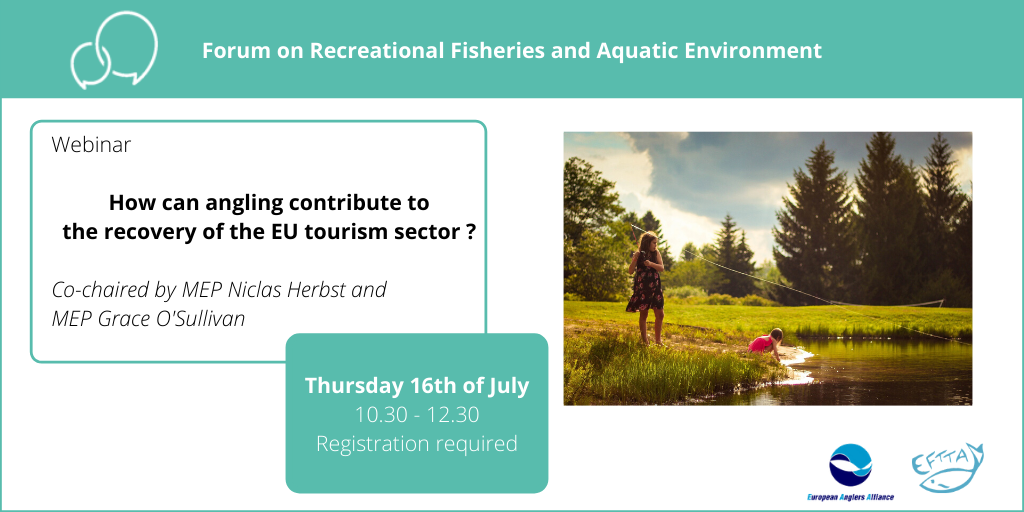Angling tourism must become an integral part of the EU’s tourism strategy
While the European Union is working on a strategy for the recovery of the EU tourism sector, the European Parliament Forum on Recreational Fisheries and Aquatic Environment held a Webinar to discuss the contribution of the recreational fisheries sector to the green recovery after the COVID-19 crisis. Angling is a very selective type of fishing, which provides many economic, social and health benefits and can create a much-needed link between conservation plans, local communities and tourists. However, more data is needed to fully grasp the sector’s potential and to develop adequate policies.
The report of the event is now available here.
On the 16th of July, MEP Niclas Herbst (Germany, EPP Group) and MEP Grace O’Sullivan (Ireland, Greens/EFA Group) co-chaired a Webinar of the European Parliament Forum on Recreational Fisheries and Aquatic Environment dedicated to a discussion on the contribution of angling to the recovery of the EU tourism sector, after the COVID-19 crisis. Both Members of the European Parliament highlighted the important social, health and economic benefits of angling, including in the context of the COVID-19 crisis. Grace O’Sullivan gave the example of Ireland, quoting a study that estimates that 406,000 individuals participated in recreational angling in 2012, with a direct spending of 555 million euros, of which 125 million euros were generated by overseas tourists.
“The promotion of angling tourism can be instrumental to support, not only the recovery of the recreational fisheries sector which has also been severely impacted by the COVID-19 crisis, but of all segments of the tourism sector especially in coastal, rural and remote areas that can only rely on few sources of income”, explained Stefan Spahn, Board member of the European Anglers Alliance (EAA).
Six different panellists took the floor to showcase good practices and challenges of angling tourism, in relation to the conservation of fish stocks and the protection of the aquatic environment. Examples from Slovenia, Denmark, Germany, Norway, Poland, Sweden and Finland were presented by the panellists. The European Commission, represented by Evelien Ranshuysen from the Directorate-General for Maritime Affairs and Fisheries, reacted to the panellists’ presentations and acknowledged the need for quality data on recreational fisheries.
Olivier Portrat, CEO of the European Fishing Tackle Trade Association (EFTTA) wrapped up the discussion by saying that “the potential of angling tourism in the context of the current health, economic and environmental crisis ultimately illustrates the need for the EU to fully integrate recreational fishing into its tourism strategy, its blue economy strategy, as well as in the Common Fisheries Policy”, and by calling again for a pan-European study to be funded and conducted by the EU, encompassing the environmental as well as the economic and social impacts of marine and freshwater recreational fisheries in Europe.
In her conclusion, MEP Grace O’Sullivan added that “comprehensive data will show the potential of the sector to deliver in a number of areas. The contribution of anglers is substantial and probably greater than our estimates. The angling community can contribute to the recovery and to building the resilience of the tourism sector”.
Press release, 17.07.2020
The Sea Trout Fyn Project,
by Martin Porsborg Hemrich, Project Coordinator (Denmark)
Webinar
How can angling contribute to the recovery of the EU tourism sector?
16 July 2020
MEP Niclas Herbst and MEP Grace O'Sullivan will co-chair the conference "How can angling contribute to the recovery of the EU tourism sector?" organised by the European Parliament Forum on Recreational Fisheries and Aquatic Environment, with the support of the European Anglers Alliance (EAA) and the European Fishing Tackle Trade Association (EFTTA).

The webinar will take place on the 16th of July from 10:30 to 12:30.
Agenda
Please register here.
The first part of 2020 was marked by the outbreak of the COVID-19 crisis which has deeply affected all segments of society. The confinement measures taken by the great majority of EU Member states to protect public health have severely impacted all business and economic activities. Specific rescue and recovery measures for the tourism sector was a strong request from the European Parliament, early on when the COVID-19 pandemic hit the EU. The strategy now proposed by the EC, which focuses also on coastal and maritime tourism, foresees some innovative ways to support tourism businesses and operators and announces the launch of a new European Agenda for Tourism for 2050.
Like many other economic sectors, the recreational fisheries one was hardly hit by the pandemic: shops and manufacturers were closed, trade flows were slowed down, fairs and travels were halted and recreational fishing was forbidden for several weeks in a large number of countries.
Given the strategy recently put forward by the European Commission to support the recovery of the EU tourism and transport sectors, the recreational fisheries sector could give an important contribution to the development of local and sustainable tourism in the EU. Anglers and recreational fisheries can contribute greatly to the transition towards more sustainable tourism practices and in making the link between conservation plans, local communities and visitors.
Angling constitutes a high-value and sustainable touristic activity especially for coastal, rural and remote areas that can only rely on a few other sources of income. Anglers contribute to the local economy by spending in shops, hotels, restaurants and support the local job market by buying tackle, renting boats and equipment or by using the services provided by fishing guides and charter companies. This fits in an important part of the Commission’s strategy, devoted to the promotion of a more sustainable model of tourism within the EU.
In this context, the round table will be the occasion to showcase several examples of angling-related tourism from different EU countries. Following short presentations, the discussion will be open to understand the role that the recreational fisheries sector can play in the development of a new model of sustainable tourism in front of contemporary challenges.